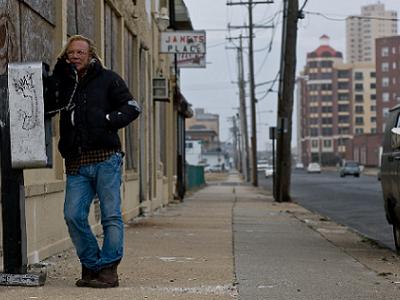
Just like everyone else, I loved The Wrestler. If you take it at face value as a character study, it's great--the central character is so likable and tough he seems like he can handle anything, but also so fragile and damaged that you know he definitely can't. The sad life of a washed-up pro wrestler would be pathetic in other circumstances, but this character is noble in his struggle to do the right thing in a bleak and lonely world.
But on top of the standard character exploration of a struggling artist, there's a lot in there about identity, performance, simulation of sex/violence, and self-determination. I'm sure cultural studies graduate students will be writing theses about it for decades to come.
Then on top of that, there's Mickey Rourke in the lead role, which brings any analysis of this movie into the fourth dimension of complexity. He's made a mythological persona for himself, a tough-guy/psychopath mystique, whose personal history is full of questionable facts and non-questionable arrests, and he's playing a character with his own manufactured mythology and identity.
Both Mickey Rourke and Randy "The Ram" Robinson, aka Robin Ramsinsky, have created careers based on stylized performances. The main difference between them seems to be that Randy is at heart a sweet person trying (and failing) to find his place in a world that has left him behind, whereas I don't know what Mickey Rourke really is. He's a big question mark. There's more on Rourke in the Times' recent magazine section feature, which highlights his emotional retelling of his life story, which may or may not be fake. There's been tons of press about the return of Mickey Rourke, about half of which is praise for an amazing performance, and the other half is about the man himself, which usually involves comments like this one from director Darren Aronofsky: "I think the reality is this, that he's basically a ripped open nerve and he's just sizzling with emotion."
Then there's the screenwriter: this is the first movie by Robert D. Siegel, former editor-in-chief of The Onion. He apparently wrote the character with Mickey Rourke in mind, so hopefully was prepared for the emotion-sizzling he got himself into. In a brief LA Times interview about a favorite scene in the movie (the one with Ratt's "Round and Round") he says, "The actual lines from the script -- Mickey does a lot of improvising -- I’m glad they made it in: 'Like there’s anything wrong with having fun'; 'The 90s sucked.'"
If you decide to be a screenwriter, and the first thing you get produced is The Wrestler, you're doing pretty great for yourself. Actually, Siegel wrote another movie first, called Big Fan, which got the attention of Darren Aronofsky, who then asked him to write The Wrestler. Siegel seems to have a really dark sense of humor and is drawn to characters that live on the fringes. He seems especially good at bringing dignity to characters whose lives might be laughable if you didn't have so much respect for them. In a recent Times interview, he says, "The idea that a person with a comedy background would do something dark should not come as a shock to people with any exposure to comedy or darkness."
Which brings us to this other movie, Big Fan, which Siegel is directing himself. He started production on it as soon as The Wrestler was finished, and it's debuting next month at Sundance.
Here's the story: Patton Oswalt plays a 35 year-old parking garage attendant in Staten Island, who loves the NY Giants. During a chance meeting with a Giant, things go horribly wrong, and he gets publicly beaten up by his idol.
Judging from this still shot from the movie, Siegel has once again captured the dinginess of working-class life:

I'm guessing that's Patton Oswalt's mother standing there at the counter, who he may or may not live with. I'm really looking forward to this one.
Here's a great poster for The Wrestler's screening at film festivals, done up like an 80's wrestling flyer.